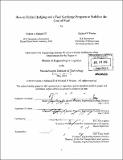How to utilize hedging and a fuel surcharge program to stabilize the cost of fuel
Author(s)
Shehadi, Charles A., III (Charles Anthony); Witalec, Michael R
DownloadFull printable version (14.12Mb)
Other Contributors
Massachusetts Institute of Technology. Engineering Systems Division.
Advisor
Chris Caplice.
Terms of use
Metadata
Show full item recordAbstract
This paper looks at some of these travails as well as the common tools used to approach a volatile priced commodity, diesel fuel. It focuses on the impacts of hedging for companies that are directly impacted through the consumption of diesel fuel in addition to companies that are indirectly impacted because they outsource their transportation. It examines the impact of a fuel surcharge and how it distributes risk throughout the supply chain. To complement the research, analysis was conducted in the form of a survey to benchmark the industry with respect to current practices of hedging and fuel surcharges, a sensitivity test of a fuel surcharge matrix to find its appropriate usage, and a simulation to provide guidance as to the appropriate strategy for hedging. Lessons learned from the survey flowed into the sensitivity testing and simulation. These three segments of analysis highlighted the problem of volatility, increasing cost, and inability to pass on the cost, proving the true pain of fuel in the market. Ultimately, the paper answers: How to utilize hedging and a fuel surcharge program to stabilize the cost of fuel? The survey showed the wide adoption of fuel surcharges, confirming the academic research. The sensitivity test proved the need to keep the escalator variable in line with a carrier's actual fuel efficiency and standardize for all carriers. The simulation recommended longer term derivatives. Putting this together, the fuel surcharge establishes stability for the carrier, at the risk of the shipper. The shipper must maintain that stability through its maintenance of the escalator in the fuel surcharge matrix. Additionally, the shipper should hedge fuel via long term derivatives to establish personal fuel cost stability, creating a competitive advantage and enabling the shipper to compete more effectively.
Description
Thesis (M. Eng. in Logistics)--Massachusetts Institute of Technology, Engineering Systems Division, 2010. Cataloged from PDF version of thesis. Includes bibliographical references (p. 101-103).
Date issued
2010Department
Massachusetts Institute of Technology. Engineering Systems DivisionPublisher
Massachusetts Institute of Technology
Keywords
Engineering Systems Division.